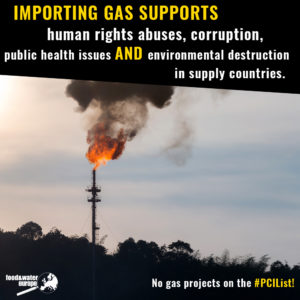Brussels – Today, the Croatian Parliament agreed on a law facilitating a planned LNG terminal offshore the island of Krk. Parliamentarians voted in favor of the Law on Liquefied Natural Gas heavily criticized by local groups and NGOs. Environmental organizations warned that the law would speed up the construction of a project implemented against the will of local communities that poses a threat to local tourism and the environment and lacks economic sense.
The project is considered highest national priority and was recently re-confirmed as a Project of Common Interest (PCI) for the EU in the PCI list adopted in March. Thanks to its PCI status, the Krk terminal recently received a grant of €102million EU public money through the Connecting Europe Facility [1].
However, growing local opposition and a worrying lack of transparency cast a bad light on the benefits the terminal receives at the EU-level. Arguments opposing the planned terminal are getting louder and include crucial questions about the need for such infrastructure considering current and projected gas demand in Croatia, as well as about the climate implications of a lock-in into fossil gas imports – even more so in connection with possible imports of particularly climate-harmful fracked gas from the United States.
On 26 and 27 March, representatives of the EU Commission’s DG Energy conducted several visits and interviews with stakeholders connected to the Krk LNG terminal in Croatia. To date, no final report about the outcomes has been produced.
“A lot of EU-tax payers’ money has been invested in this terminal, and yet we have serious doubts over its economic sense and its democratic legitimacy. Local decision makers oppose this project, communities protest against it, and there is no market for a project of this size, yet still the EU Commission will provide over €100 million for its construction,” says Frida Kieninger, Campaign Officer at Food & Water Europe. “We want to see the conclusions of the EU Commission’s fact-finding mission and highly doubt that the provided CEF money is invested with appropriate diligence.”
Both an offshore terminal, as it is currently discussed, as well as an onshore LNG facility constitute costly fossil fuel infrastructure, threatening to weigh heavy on Croatians’ gas bills. LNG terminals can be operated for decades, locking us into fossil gas far beyond the moment by which we will have to manage a complete fossil fuel phase-out to avert the worst of the climate chaos ahead.
Contact: Frida Kieninger – Tel: +32 (0) 2893 1045, Mobile: +32 (0) 487 24 99 05
_______________________



